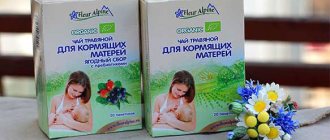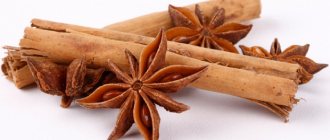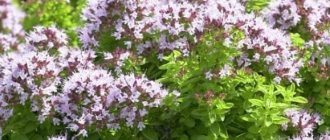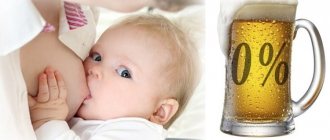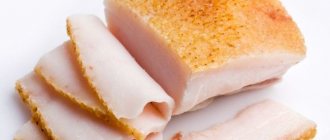Breastfeeding requires following a special diet, especially in the first three months of the baby's life. In newborns, the metabolic system, gastric environment and intestinal microflora are just beginning to form. It is these factors that determine nutritional rules that require strict control of substances entering the mother’s body. This also applies to drinks. Modern mothers, using natural herbal decoctions, try to increase lactation and eliminate colic in children. This article will discuss the question “is it possible to drink mint tea while breastfeeding.”
The benefits of mint during breastfeeding
It is rich in useful substances and has a beneficial effect on the body of mother and child.
Mint helps a nursing mother relax during lactation. It also helps relieve headaches, which often worries mothers so much.
Interesting!
Mint copes with the task of preventing colic in a newborn.
Since the substances contained in mint pass into breast milk and enter the baby’s body, this seasoning also helps remove excess body fluid. An interesting property is the prevention of the inflammatory process.
Many people, with the exception of its interesting taste, like it because it improves the functioning of the digestive system. It reduces flatulence, eliminates heartburn, and increases appetite. Mint is a natural antiseptic and is excellent at killing harmful germs. Now we can say with certainty that mint is a truly amazing find! It contains a unique amount of useful substances. But how will an infant’s body react to this?
Harm of mint during breastfeeding
Alas, this miracle, which is a treasure trove of vitamins, is not entirely safe for babies.
There are many different types of mint in the world. One of the most popular is pepper. It contains a large dose of menthol. This is very dangerous, since all the oils that pass into mother’s milk will definitely enter the child’s body.
Important!
Menthol affects the baby's heartbeat, as a result of which the heart rhythm may be disrupted.
This is dangerous because it can be fatal.
Mint acts to reduce lactation. The menthol it contains can affect your milk supply. Doctors try not to prescribe medications containing menthol to nursing women so as not to reduce lactation.
It's no secret that it stimulates the production of estrogen, the female hormone. While in men, testosterone decreases significantly. Therefore, it is dangerous to drink drinks with a high content of mint while breastfeeding a boy. It is better for mothers to completely avoid eating dishes containing this seasoning for a while, so as not to disrupt the full development of the newborn.
The effect of mint and lemon balm on the body of a nursing mother and child
Teas and decoctions of mint or lemon balm have similar properties, but affect the body differently.
Many mothers, fearing the negative effect of caffeine contained in coffee and tea, replace these drinks with herbal infusions during breastfeeding. Peppermint tea is often credited with miraculous properties - it supposedly soothes and increases lactation. In fact, this is a myth. Firstly, mint has a tonic, not a sedative effect on the mother’s body.
Secondly, this plant is used to suppress lactation when a woman finishes breastfeeding. In this case, mint is brewed together with sage and a strong infusion is prepared, consumed throughout the day. There is no scientific evidence of the effect of mint on the amount of milk, since experiments have not been conducted on nursing mothers. However, it is known that the essential oils contained in mint can cause allergies in the baby. The product belongs to the category of highly allergenic and can cause a rash or redness of the skin in infants. Breastfeeding experts recommend sticking to the “golden mean” - sometimes including mint in the diet in the form of a weak infusion or a few leaves of a fresh plant if there are no negative reactions in the child .
Melissa has a different effect on the body of mother and baby. This plant is called a natural antidepressant. Unlike mint, lemon balm calms the nerves and helps fight insomnia. The calming effect also extends to the baby - many mothers note that the baby sleeps better if they drink a cup of lemon balm tea before breastfeeding. The well-known lactogon effect is exerted, rather, not by the lemon balm itself in tea, but by the large volume of warm liquid entering the body. It is also believed that lemon balm improves the taste of breast milk, making it more aromatic and more pleasant for the baby. Melissa belongs to the category of low-allergenic herbs, but cases of allergies in the baby are not excluded, so the product should be introduced into the diet with caution.
I heard that you can use lemon balm, but mint will ruin the milk. I drink it with lemon balm, everything is fine with milk.
Oksana
https://www.baby.ru/blogs/post/99580565–12944893/
In one of our maternity hospitals, after childbirth they give tea with lemon balm so that milk comes in, I haven’t heard about mint...
Mariska
https://www.baby.ru/blogs/post/107990336–22924690/
I drank mint for several days. Then I just read that it reduces lactation. There really wasn't enough milk.
Lena
https://www.babyblog.ru/community/post/01medicina/304122
Useful properties for nursing
Melissa will help mom and baby calm down and prepare for bed.
Peppermint is rich in essential oils. This is both an advantage and a disadvantage of the product for nursing mothers. Thanks to the menthol present in mint, it has a sharp but pleasant smell, it invigorates and tones. However, this effect also extends to the baby, who may be too active and have trouble sleeping. Mint can also calm your appetite and suppress the feeling of hunger. However, the lactation period is not the best time for losing weight; the mother’s diet should be complete and balanced. Due to the high concentration of essential oils in mint, its allergenic status and many other properties, it is worth giving preference to lemon balm during breastfeeding. This herb has a much gentler effect on the body of a nursing mother and has a beneficial effect on the well-being and quality of milk. In addition, lemon balm has the following positive qualities.
- Diuretic effect. Melissa helps get rid of fluid stagnation in tissues, speed up metabolism, and stimulate the production of breast milk.
- Improves blood formation. Magnesium, iron, potassium improve blood composition, prevent the formation of cholesterol plaques, and remove toxins and heavy metals.
- Normalizes the functioning of the stomach. Melissa juice has an analgesic and antispasmodic effect on the walls of the stomach and helps stabilize digestion.
- Improves the functioning of the nervous system. B vitamins, zinc, manganese have a beneficial effect on brain activity, improve memory and attention.
- Restores hormonal levels. Melissa is known for its positive effect on women's health - it helps to regulate hormonal levels and stabilize the menstrual cycle after childbirth.
- Strengthens the immune system. Melissa has a general strengthening effect on the body, helps fight colds and speed up the healing process.
- Sedative effect. Herbal tea relaxes and calms, helps fight insomnia and nervousness, fatigue, and postpartum depression.
What kind of mint can mothers use during breastfeeding?
Eating peppermint is dangerous due to the menthol content it contains. But there is a great alternative, spearmint. It is a little less common, but it is the safest to feed. This mint contains carvone, this substance stimulates lactation. You can safely take spearmint tea as food, but do not forget about reasonable dosages.
Impact on mom
Following traditional medicine recipes, mint is used to treat colds. The green leaves of the fragrant plant calm the nervous system, increase vitality and are a strong antioxidant. The essential oils contained in the plant have an anti-inflammatory effect and reduce the risk of developing diseases of the gastrointestinal tract. This perennial is considered a natural antibiotic because it is effective in combating various harmful microorganisms and fungal infections.
Peppermint has a high menthol content. This element refreshes, gives vigor and provokes a one-time influx of mucous secretions. With one-time use, the young mother feels a surge of milk. But frequent consumption of peppermint tea helps lower blood pressure. The sedative effect of menthol causes drowsiness and apathy.
Drinking large amounts of herbal tea every day negatively affects breast milk production. This remedy can be used to complete lactation. Another type of mint has the opposite effect. The leaves of the spikelet or curly fragrant grass differ in shape and composition. The main substance is carvone. The compound helps increase the volume of milk in the mammary gland. Low menthol content reduces the risk of developing artificial hypotension.
We recommend that you familiarize yourself with the benefits and harms of chamomile infusion
However, during the period of feeding a child, it should be remembered that any medicinal plants must be used with caution and only on the recommendation of a doctor.
When and in what quantity can you start using mint?
Before eating mint, you should visit a therapist and pediatrician. These specialists will be able to accurately and correctly select the correct dosage of the new product. It may also turn out that mom shouldn’t eat mint at all. Any new product introduced can cause a different reaction. The opinion that natural herbs cannot cause an allergic reaction is absolutely wrong. It is better to start trying a drink containing mint with a few sips at breakfast. It is advisable if this happens after feeding the baby. And carefully monitor the child’s condition for several days.
If an allergic reaction is not observed, then the dose can be gradually increased. But drinking mint drink should be in moderation.
In what form can mint be consumed during breastfeeding?
A suitable option would be to use mint in drinks. This could be warm tea or a soft drink.
Important!
It is strictly forbidden to chew fresh mint leaves! Due to the content of essential oils in them, the leaves become very dangerous for the fragile digestive system of the baby.
As for toothpastes containing menthol, they are completely safe.
Recipes for drinks using mint for breastfeeding
Here we will look at recipes for mint drinks that will have a certain effect on lactation.
Mint drink recipe 1
This recipe helps reduce lactation.
Ingredients:
- 4 teaspoons of dry mint leaves;
- 1 liter of boiling water.
Pour water over mint and leave. Drink 3-4 times a day. Store in the refrigerator; the next morning the drink is not suitable for consumption.
Mint drink recipe 2
This recipe helps increase lactation.
Ingredients:
- 2-3 leaves of mint;
- a glass of boiling water.
Pour water over mint. Leave covered for half an hour. To increase lactation, drink 200 grams per day.
How can you replace mint tea during lactation?
If mint tea during breastfeeding is not suitable for the mother or causes negative reactions from the baby’s body, it can be replaced with another drink. So, during breastfeeding it is permissible to drink green or chamomile tea. It is better for a nursing mother to drink green tea in the first half of the day, as it has a tonic effect that is not at all necessary before bed.
You can also drink a mixture of mint and chamomile. This is an excellent sedative, which also has a strong antiviral effect. Green tea with a few mint leaves on the contrary will invigorate and help you feel a surge of strength and energy.
Reviews from mothers about mint
Elena, 29 years old. I tried drinking mint tea to reduce lactation. And it really works! There was no rash. And the child got used to it, then she stopped breastfeeding. Natural product, no chemicals! Second birth, there was a lot of milk. But we coped with this task, I highly recommend it to everyone if they don’t have allergies.
Svetlana, 22 years old. I really love tea with this herb. I treated myself once, my son reacted normally. Plus, lactation has increased, which I am very happy about. My son is 8 months old, I drink tea 3-4 times a week. But for cooking I use exclusively mint. I know about the negative effects of peppercorn, so I’m afraid to give it.
Properties of mint tea
Mint is one of the most aromatic plants known in many regions of the world. She is especially loved in France; it is not for nothing that the authors of the popular novel about Angelica, Anna and Serge Golon, described her so beautifully in their books. What is the benefit of mint tea during breastfeeding and what are its main properties?
The first and most obvious property of tea is its pronounced aroma, which anyone can recognize, even if they never drink it. The whole point is menthol and menthol essential oil, of which there is a lot in the leaves of the plant. Menthol has a calming effect and normalizes blood pressure and heart rate. The rich vitamin and mineral composition of the plant allows it to be used for colds, coughs, and poor digestion.
Peppermint tea heals the intestinal mucosa, improving the absorption of nutrients through its walls. It is good to drink regularly for hypertensive patients and heart patients, people who sleep poorly or are under stress for a long time. Finally, mint is often used in aromatherapy, promoting relaxation, cosmetology, improving complexion and tightening enlarged pores. With breastfeeding, it has many contradictions.
